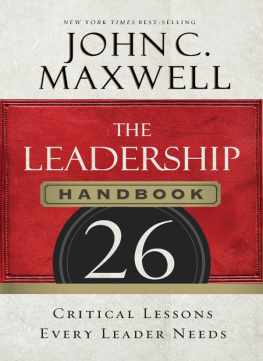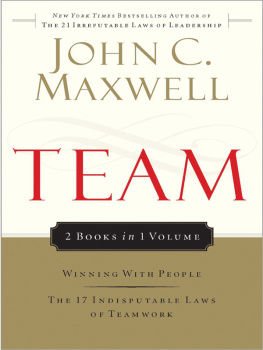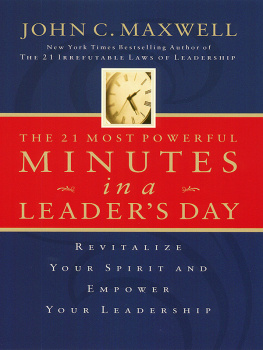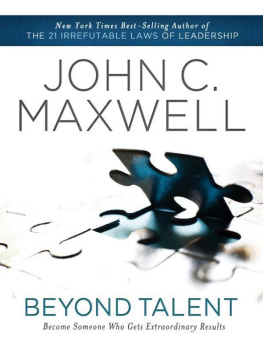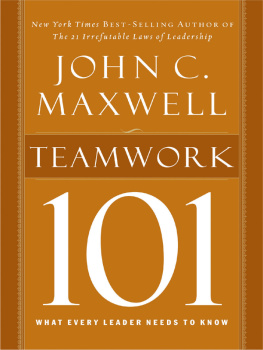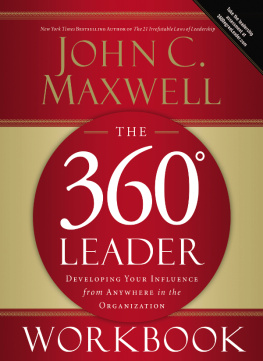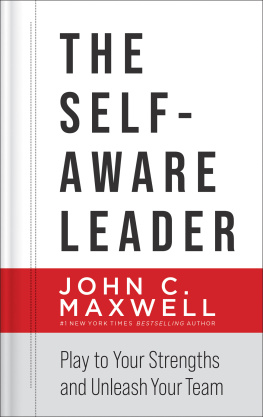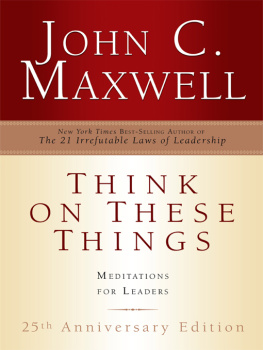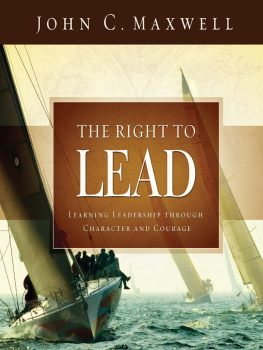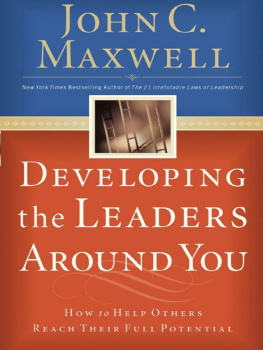
Copyright 2021 by Maxwell Motivation, Inc.
Cover design by Brand Navigation. Cover copyright 2021 by Hachette Book Group, Inc.
Hachette Book Group supports the right to free expression and the value of copyright. The purpose of copyright is to encourage writers and artists to produce the creative works that enrich our culture.
The scanning, uploading, and distribution of this book without permission is a theft of the authors intellectual property. If you would like permission to use material from the book (other than for review purposes), please contact permissions@hbgusa.com. Thank you for your support of the authors rights.
The author is represented by Yates & Yates, LLP, Literary Agency, Santa Ana, California.
Center Street
Hachette Book Group
1290 Avenue of the Americas, New York, NY 10104
centerstreet.com
twitter.com/centerstreet
First Edition: July 2021
Center Street is a division of Hachette Book Group, Inc. The Center Street name and logo are trademarks of Hachette Book Group, Inc.
The publisher is not responsible for websites (or their content) that are not owned by the publisher.
The Hachette Speakers Bureau provides a wide range of authors for speaking events. To find out more, go to www.HachetteSpeakersBureau.com or call (866) 376-6591.
Names: Maxwell, John C., 1947author.
Title: Leading in tough times : overcome even the greatest challenges with courage and confidence / John C. Maxwell.
Identifiers: LCCN 2021006599 | ISBN 9781546029380 (hardcover) | ISBN 9781546029373 (ebook)
Subjects: LCSH: Executive ability. | Leadership. | Teams in the workplacePsychological aspects. | Communication in management. | Crisis management.
Classification: LCC HD38.2 .M3922 2021 | DDC 658.4/092dc23
LC record available at https://lccn.loc.gov/2021006599
ISBNs: 978-1-5460-2938-0 (hardcover), 978-1-5460-2937-3 (ebook)
E3-20210529-JV-NF-ORI
Change Your World
The Leaders Greatest Return
How to Lead When Your Boss Cant (or Wont)
Developing the Leader Within You 2.0
No Limits
Intentional Living
How Successful People Win
Good Leaders Ask Great Questions
How Successful People Grow
Sometimes You Win, Sometimes You Learn
How Successful People Lead
The 15 Invaluable Laws of Growth
The 5 Levels of Leadership
Everyone Communicates, Few Connect
How Successful People Think
Beyond Talent (formerly Talent Is Never Enough)
Winning with People
Today Matters
Thinking for a Change
The 17 Essential Qualities of a Team Player
The 17 Indisputable Laws of Teamwork
Failing Forward
The 21 Indispensable Qualities of a Leader
The 21 Irrefutable Laws of Leadership
I want to say thank you to Charlie Wetzel and the rest of the team who assisted me with the formation and publication of this book. And to the people in my organizations who support it: You all add incredible value to me, which allows me to add value to others. Together, were making a difference!
A s human beings, we seem to believe that life is supposed to be easy. This is particularly a problem in America today. We expect a smooth and easy road to success. We expect our lives to be hassle-free. We expect the government to solve our problems. We expect to get the prize without having to pay the price. That is not reality! Life is hard.
In Lifes Greatest Lessons, Hal Urban writes,
Once we accept the fact that life is hard, we begin to grow. We begin to understand that every problem is also an opportunity. It is then that we
This reality is especially important for leaders to recognize and embrace. Nothing worth having in life comes without effort. That is why psychiatrist M. Scott Peck begins his book The Road Less Traveled with the words Life is difficult. If we dont understand and accept the truth that life is difficult, that leadership is difficult, then we set ourselves up for failure and we wont learn or succeed.
As leaders, even if we are willing to concede that life is difficult for most people, deep down inside many of us secretly hope somehow that this truth wont apply to us. But no one escapes lifes problems, failures, and challenges. If we are to make progress, we must do so through lifes difficulties. Or as poet Ralph Waldo Emerson stated it, The walking of Man is falling forwards.
The Advantages of Adversity
Good leaders understand that adversity and challenges are actually opportunities to rise up in leadership.
1. Adversity Introduces Us to Ourselves
Adversity always gets our attention. We cant ignore it. It causes us to stop and look at our situation. And at ourselves if we have the courage. Adversity creates an opportunity for self-discovery. As the great Egyptian leader Anwar el-Sadat said, Great suffering builds up a human being and puts him within the reach of self-knowledge. This I believe is trueif we embrace it.
One of my favorite books is As a Man Thinketh by James Allen. My father required me to read it when I was in my early teens. One of the ideas that left the strongest impression on me as a youth was this: Circumstance does not make the man; it reveals him to himself.
2. Adversity Is a Better Teacher Than Success
Adversity comes to us as a teaching tool. Youve probably heard the saying When the pupil is ready, the teacher will come. That is not necessarily true. With adversity, the teacher will come whether the pupil is ready or not. Those who are ready learn from the teacher. Those who are not dont learn. Oprah Winfrey advises, Turn your wounds into wisdom. Leaders can do that only when they have the right mind-set.
3. Adversity Opens Doors for New Opportunities
One of the greatest lessons Ive learned as a leader is that adversity is often the door to opportunity. Good entrepreneurs know this instinctively, but most people have been trained to see adversity the wrong way. As speaker and cofounder of the Rich Dad Company, Kim Kiyosaki, observed, Most of us are taught, beginning in kindergarten, that mistakes are bad. How often did you hear, Dont make a mistake! In reality, the way we learn is by making mistakes. A mistake simply shows you something you didnt know. Once you make the mistake, then you know it. Think about the first time you touched a hot stove (the mistake). From making that mistake, you learned that if you touch a hot stove you get burned. A mistake isnt bad; its there to teach you something.
When many people face adversity, they let it get them down. Instead, they need to look for the benefit or opportunity. One of my favorite examples of this occurred with Procter & Gamble back in the 1870s. One day at the factory, an employee went to lunch and forgot to turn off the machinery that was mixing the soap. When he returned, the soap had increased in volume because air had been whipped into it. What a mistake! What should he do? He didnt want to throw it out, so he poured it into the frames, and it was cut, packaged, and shipped, even though he had ruined it.
A few weeks later, the company began receiving letters from customers asking for more orders of the soap that floated. Why? The soap was used in factories. At the end of their shift, factory workers washed at vats of standing water that became murky. Bars of soap that floated were easier to find when dropped. A manufacturing mistake led to an opportunity, the creation of Ivory soap, which is still sold today, more than one hundred years later.


